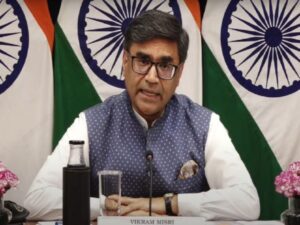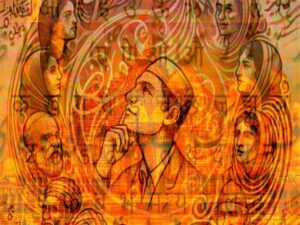Pakistan chose extremist Islam over economic stability: Report
Karachi [Pakistan], February 20 (ANI): The Pakistan Telecommunication Authority (PTA), on February 3, blocked Wikipedia nationwide. Although the ban was overturned three days later, in its statement the PTA said that Wikipedia refused to remove “sacrilegious contents” from the website. By curtailing free speech and doubling down on blasphemy laws, Islamabad is endangering its relationship with Europe and the United States, Foreignpolicy.com reported.
In 2020, Pakistan threatened legal action against Google and Wikipedia for “disseminating sacrilegious content,” regarding Islamic beliefs held by minority Muslim sects. On February 11, a man was lynched by a mob in the eastern city of Nankana Sahib over allegations of blasphemy. The victim was killed inside the local police station, with the law enforcement authorities being hapless bystanders. The Pakistan Penal Code (PPC) was co-opted after Partition in 1947 from the Indian Penal Code (IPC) of 1860, with Sections 295 and 298 dedicated to desecrating worship places and outraging religious sensibilities, respectively. The original sections in the IPC are equally applicable to all religions. But in the 1980s Pakistan added Islam-specific clauses.
In January 2023, the National Assembly of Pakistan amended PPC to expand its blasphemy laws. One of those amendments, the Criminal Laws (Amendment) Bill, 2023, ups the penalty from three years to life imprisonment. The PPC criminalizes any sacrilege against the Quran and the prophet, with penalties including capital punishment. Foreignpolicy.com reported that even though Pakistan is yet to execute anyone for sacrilege, its blasphemy laws continue to encourage mob violence. The most high-profile victim of the blasphemy laws was one of their staunchest critics, former Punjab Gov. Salman Taseer, who was gunned down by his security guard in 2011.
Last year, a teacher was attacked and killed by her colleague and students in an all-girls school, a mentally unstable man was stoned to death by a mob, and a man born without arms was drowned, in separate incidents of blasphemy killings. Last month, a Muslim man threatened to incite mobs against a Christian security officer working at the Karachi airport. He accused her of blasphemy after the woman denied his acquaintance entry into the premises. While the blasphemy laws have disproportionately harmed non-Muslims and Muslims in Pakistan. The man was killed for blasphemy in October for expressing devotion at the graves of Sufi saints that the vast majority of South Asian Muslims have traditionally adhered to. The ideology of takfir, or excommunicating Muslims, is based on outlawing divergent beliefs and penalizing those deemed guilty per sharia, with punishments for apostasy that include execution.
The takfiri ideology fuels murderous sharia codes and jihadi groups alike. Outfits such as the Islamic State and its Pakistani Taliban affiliates have bombed Sufi shrines over the years, deeming the mystic practices heretical. The Islamic State-orchestrated 2017 bombing at the Lal Shahbaz Qalandar shrine in Sehwan, killing at least 90 people, remains one of the deadliest terrorist attacks in Pakistan’s history.
The Islamic State and the Pakistani Taliban have similarly targeted Shiite mosques across the country, dubbing Shiites, comprising the second-largest sect of Islam, collectively guilty of blasphemy. And the Criminal Laws (Amendment) Bill, 2023, passed last month, is the systematization of this anti-Shiite narrative, which borders on the codification of the entire sect’s ex-communication, Foreignpolicy.com reported.
The amendment passed by the National Assembly outlaws Shiite beliefs by enforcing Sunni theology and tradition.
Following the enactment of the Prevention of Electronic Crimes Act in 2016, the state initiated a war on nonbelief, sending official texts nationwide asking users to report any form of blasphemy. Just as Shiites today are being compelled into shunning their beliefs so as to be accepted as Muslims in Pakistan, Ahmadis were forced to do the same with their faith in their sect’s 19th-century founder, Mirza Ghulam Ahmad, via the Second Amendment to the Pakistani Constitution in 1974.
The official declaration of Ahmadis as non-Muslims was followed by Sections 298-B and 298-C a decade later, banning the community from “posing as Muslims,” including referring to Islamic literature or expressions.
This veritable apartheid against Ahmadi Muslims over the past four decades has seen members of the community killed, their mosques vandalized, and graves desecrated. Ahmadis have to be declared non-Muslims for individuals to obtain a passport, exercise the right to vote, or even get a marriage certificate. Among the Wikipedia contents flagged by the PTA are pages on Ahmadiyya Islam.
While Shiites and Ahmadis are subjugated owing to their beliefs, nonbelievers are also targeted in Pakistan. Atheism and apostasy, as an extension of blasphemy, are punishable by death in Pakistan. Within a month of the Punjab bill being passed, 42 blasphemy cases were lodged, predominantly against the Shiite community, including against a 3-year-old. The toddler, Syed Fazal Abbas Naqvi, was taken into custody along with his father and uncle, with all of them facing terrorism charges before being released on bail. The Criminal Laws (Amendment) Bill, of 2023 has been followed by a spike in Shiite killings in the town of Dera Ismail Khan.
While the financially motivated Arab states that historically spread radical Salafism worldwide are now embracing moderation, Pakistan appears to be wholly invested in being the bastion of Sunni fundamentalism.
The United States, despite its withdrawal from the region, wouldn’t want a Pakistan that spirals further into radical Islamist disintegration at a time when the Western powers are still mulling the fate of the jihadi takeover in Afghanistan. Pakistan’s devastating economic crisis can further push the United States to condition any financial support to human rights advancements.
The Saudi and U.S. petrodollars that helped sustain Pakistan’s jihadi structure are no longer on the table. Global institutions are mulling sanctions over Pakistan’s human rights abuses, especially its blasphemy laws. Any government expanding these codes in a way that risks increasing global sanctions is clearly not invested in Pakistan’s economic well-being.






